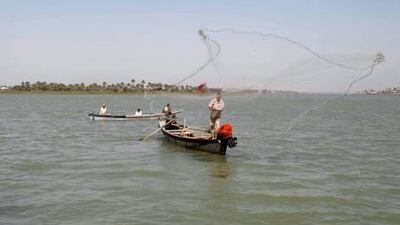FAW, IRAQ // Since time immemorial, villagers on Iraq's Faw peninsula have fished the waters where the Tigris and Euphrates reach the Gulf. But today, they say violent sea border disputes are forcing them off their boats.
The town of Faw near Iraq's coast has around 40,000 inhabitants, most of them fishermen and their families. Town officials say hundreds of families have left in search of other work, leaving the port in danger of becoming a ghost town.
Fishermen complain of rises in the cost of fuel and oil shortages. But mostly they worry about confrontation with Iranian and Kuwaiti coast guards.
"They jabbed one of our guys with a knife and bound him with ropes and dunked him in and out of the water like torture. His only crime was that he was a fisherman," said Issa Abdul-Wahid, 43, describing a recent incident with a Kuwaiti patrol.
"They tell us 'You do not have waters. Your borders are the mud.' But these are our waters," he said.
Once the owner of his own boat, Mr Abdul-Wahid said Kuwaitis confiscated his vessel and held it for six months before returning it stripped of equipment. Too poor to refurbish it, he has been reduced to working as a labourer on other men's boats.
"We have no other livelihood but fishing, but our suffering is huge. I have a family to feed. What have we done to deserve this, a government that can't protect us?"
Ali al Kanaani, head of the Faw city council, said there were once 2,000 fishing boats operating from the town, but now there are just 400 or 500. Each boat has a pilot and 10 crew. With each fisherman usually supporting a large family, 100 people could depend for their livelihoods on a single boat.
Iraq has only narrow access to the sea. Its Faw peninsula is surrounded by a 50-kilometre stretch of sea coast facing Kuwait on one side, and by the wide Shatt al Arab waterway overlooking the marshes of southern Iran on the other.
The Shatt al Arab is formed where the Tigris and the Euphrates merge at Qurna, a town some believe to be the site of the biblical Garden of Eden. It runs 184km to the Gulf. An invisible line down much of its length serves as the border between Iran and Iraq.
Control of the waterway was one of the main reasons for the costly and bitter war between Iran and Iraq that lasted through most of the 1980s. The boundary dispute is still not settled.
Kuwait and Iraq have also yet to define a sea border in settlement talks since Iraq's 1990 invasion. Many at the docks say Iraqis are viewed with hostility by Iranians and Kuwaitis still bitter over Iraq's wars against them.
In January, a Kuwaiti coastguard was killed and five Iraqi fishermen were wounded in a shoot-out with Iraqi sailors. Kuwait says the clash erupted when an Iraqi boat entered Kuwaiti waters and refused orders from a coastguard patrol to stop.
Faw's mayor said the incident took place in Iraqi waters.
In December 2010, Iranian coast guards detained 12 Iraqi fishermen who they say illegally entered Iran's waters. Three of them were later freed.
Like his father and grandfather before him, Khalef Yousif became a fisherman in his teens, learning the old techniques of casting a net from a metal-hulled boat, hauling in catches of silver pomfret, grouper and shrimp.
After nearly two decades at sea, he abandoned the life a year and a half ago and moved with his wife and three children from the port of Faw to a small plot 90km north.
He has become a farmer, planting cucumbers and tomatoes on land he was able to buy for a pittance because so many other families are moving out of the area, going even further north.
"The fishing business is not good anymore. Kuwaitis were harassing us wherever we go," he said, sitting near his shack.
Waleed al Sharifi, Faw's mayor, said the entire fishing industry may soon vanish altogether. Once, fishermen were protected by Iraq's navy, but the force has yet to be fully rebuilt since the US invasion in 2003.
"Unfortunately the Iraqi officials always put the blame on the Iraqi fishermen," he said. "The fishing career is threatened with extinction for many reasons. I would say if the situation stays as it is, the career will become extinct and without it, Faw will be empty of people."

